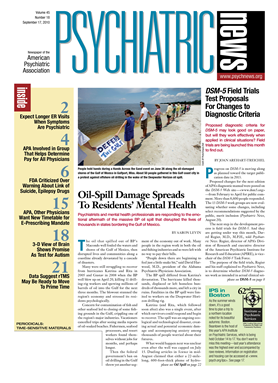Psychiatrists and other physicians who treat Medicare patients will need to begin using digital prescription-writing programs by the beginning of 2011 or face cuts in their Medicare payments, according to proposed federal regulations issued this summer.
Medicare began offering bonuses last year to physicians who use electronic prescribing for their Medicare patients. However, Medicare officials plan to begin cutting reimbursements in 2012 if participating physicians do not meet federal standards related to the extent and type of their program participation.
The Centers for Medicare and Medicaid Services (CMS) issued proposed new rules for the program this summer that would include prescriptions written in the first six months of 2011 in determining physician compliance with the e-prescribing rule.
Under the regulations proposed to implement the Medicare Improvements for Patients and Providers Act of 2008 (MIPPA), participating physicians who fail to meet the program's minimum requirements starting in the first half of 2011 would begin having their Medicare reimbursements cut by 1 percent in 2012, and those cuts would rise to 2 percent in 2014 and thereafter. The cuts would be based on whether physicians had written a minimum of 10 e-prescriptions within the first six months of 2011.
The proposed regulations—expected to be finalized by November—also would ease the program's participation requirements. Instead of the current requirements that physicians use e-prescribing for at least 50 percent of their prescriptions, the changes would require e-prescriptions for only 25 patients annually.
Although APA supported the lowering of participation requirements to qualify for the incentive payment, it and other physician groups have expressed serious concerns about the 2011 penalty start date.
“APA strongly opposes this proposal to impose the penalties against physicians who do not meet the requirements in the first half of calendar year 2011,” wrote APA Medical Director James H. Scully Jr., M.D., in an August 24 letter to Donald Berwick, M.D., the new CMS administrator. “We believe that this is not in line with the intent of the statute and is impracticable for many physicians who would be able to participate in the program.”
Scully noted that the proposed regulations appear to conflict with the MIPPA, because that law refers only to physician prescribing activities in 2012, 2013, and 2014.
Additionally, CMS has not yet released its analysis of physician compliance with the e-prescribing program in 2009, which will address whether physicians have had difficulty meeting the existing requirements, much less new ones.
“Inflicting financial penalties in 2012 and 2013 based on 2011 e-prescribing activity without fully assessing the 2009 and 2010 program, including adoption and use rates, is unfair and unreasonable,” Scully wrote.
Deadline Complications Arise
Compliance with the 2011 timeframe is complicated by several factors, including Drug Enforcement Administration (DEA) rules that have long banned e-prescribing of controlled substances. Although the DEA recently issued regulations to allow such prescribing, e-prescribing software companies have not incorporated that change.
“While this long-awaited policy change is welcome, the security and program requirements are very steep, and we are unaware of many prescribing software packages that will be on the market and affordable for physician use, which makes it unlikely that many physicians will be able to e-prescribe controlled substances,” Scully told Berwick.
The controlled-substance issue is particularly relevant to psychiatrists since many of the prescriptions they write are for medications in that category. Due to the long-standing DEA ban and related lack of controlled-substance prescribing software, as well as the cost for solo and small group practices, many psychiatrists have held off buying e-prescribing systems.
APA Supports Some Provisions
The proposed CMS regulations did draw APA support for exempting some eligible physicians from the e-prescribing penalty. Individual physicians and group practices in rural areas with limited high-speed Internet access, for example, would be eligible for an exemption. Additionally, physicians and group practices in areas with few pharmacies capable of processing e-prescriptions could receive a penalty exemption.
Scully urged CMS to add more exemption categories, including physicians who plan on participating in the separate federal electronic health record incentive program by 2014 and physicians who are already eligible to collect Social Security benefits or who will be eligible by 2014.
